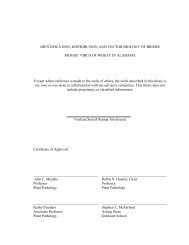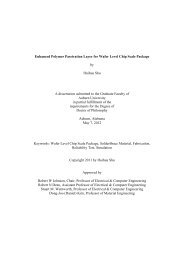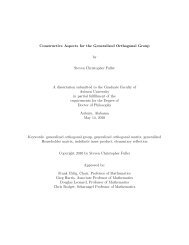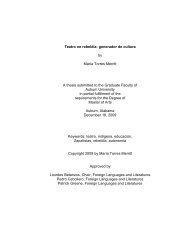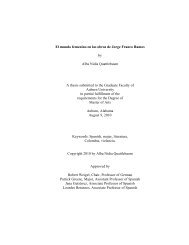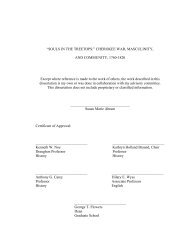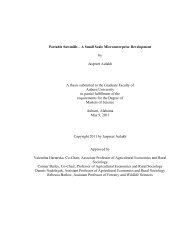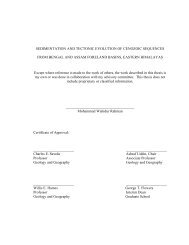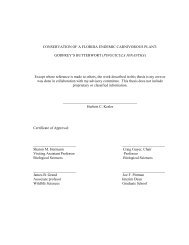the trouble with gender in othello - Auburn University Electronic ...
the trouble with gender in othello - Auburn University Electronic ...
the trouble with gender in othello - Auburn University Electronic ...
Create successful ePaper yourself
Turn your PDF publications into a flip-book with our unique Google optimized e-Paper software.
Sa<strong>in</strong>ts <strong>in</strong> your <strong>in</strong>juries, devils be<strong>in</strong>g offended,<br />
Players <strong>in</strong> your housewifery, and housewives <strong>in</strong> your beds.<br />
[…] your rise to play, and go to bed to work. (II.i.125-128, 131)<br />
Iago, as I will discuss later <strong>in</strong> this <strong>the</strong>sis, performs <strong>the</strong> role of <strong>the</strong> re-enforcer of<br />
<strong>the</strong> status quo. Therefore, we can take that his “script” is <strong>the</strong> “script of <strong>the</strong><br />
oppressive status quo” (Falluga). Desdemona, had she followed <strong>the</strong> script that<br />
she was meant to, would still have been doomed. Because a prom<strong>in</strong>ent script <strong>in</strong><br />
<strong>the</strong> early 17 th century stated that women were carnal be<strong>in</strong>gs, Iago does not even<br />
have to work very hard to conv<strong>in</strong>ce O<strong>the</strong>llo of Desdemona’s treachery. O<strong>the</strong>llo<br />
has lived <strong>in</strong> Venice long enough to be aware of <strong>the</strong> script that controls <strong>the</strong><br />
patriarchy <strong>the</strong>re.<br />
However, Perhaps one of <strong>the</strong> most debated and discussed l<strong>in</strong>es <strong>in</strong> O<strong>the</strong>llo, <strong>the</strong><br />
one that causes nearly all critics that discuss <strong>the</strong> character of Desdemona are<br />
driven <strong>in</strong> one way or ano<strong>the</strong>r to expla<strong>in</strong>, are Desdemona’s dy<strong>in</strong>g words: “Emilia:<br />
O, who hath done this deed? Desdemona: Nobody—I myself.” (V.ii. 148-149)<br />
This l<strong>in</strong>e is often used to support critics’ arguments that Desdemona is<br />
complicit <strong>in</strong> her own death, ei<strong>the</strong>r by her will<strong>in</strong>gness to lie <strong>with</strong> her immortality<br />
at hand or by her supposed passivity. I would not completely disagree that<br />
Desdemona’s dy<strong>in</strong>g words and actions <strong>in</strong> her death imply a certa<strong>in</strong> complicity,<br />
but I would not agree that she is represented as deserv<strong>in</strong>g death at <strong>the</strong> hands of<br />
17






